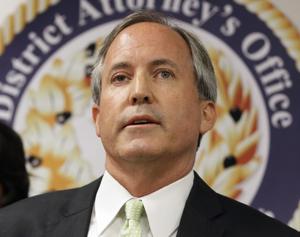Texas AG negotiates $26 billion opioid settlement

(The Center Square) – Texas Attorney General Ken Paxton has negotiated the largest opioid settlement in the history of the U.S. The $26 billion agreement with three of the nation’s major pharmaceutical distributors will be used to fund a range of programs to assist Texans struggling with opioid addiction.
The groups involved in the settlement include distributors Cardinal, McKesson, and AmerisourceBergen, and Johnson & Johnson, which manufactured and marketed the opioids.
“The settlement is nationally the largest state-driven settlement,” Paul Singer, senior counsel for Public Protection in the AG’s office, told The Center Square, “and it started when Gen. Paxton came into office when he saw the opioid crisis and the uptake in lawsuits all over the country, where cities and counties and states were all bringing legal action against opioid manufacturers, distributors, pharmacies, everyone in the supply chain that led to this crisis.
“General Paxton recognized at a very early point that the only way we were going to abate this crisis was to get everybody together and fund abatement programs for the future,” Singer added. “He worked with his colleagues throughout the country, pulled together a group and was able to negotiate this historic settlement that has the opportunity to deliver the funding we need for these treatment programs.”
In 2020, 93,000 people died from opioid overdoses in America – nearly 30% more than in 2019.
“One in five Texans has experienced an opioid overdose or knows someone who has,” the Texas Department of Health and Human Services reports. “Four of the nation’s top 25 cities for opioid misuse are in Texas — Texarkana, Amarillo, Odessa, and Longview.”
Nationally, more than 130 people die a day from opioid-related drug overdoses, the CDC reports.
Under the agreement, Texas could receive as much as $1.1 billion, the vast majority of which would be spent on opioid abatement pursuant to a new state law. The actual amount Texas receives will depend upon the participation of cities, counties, and other political subdivisions in the state.
The Attorney General’s office is calling on Texas cities and counties to participate in the settlement, as well as any other state to join. Once a state’s attorney general and governor sign on, cities and counties in their state can be added to the settlement.
Paxton previously announced an agreement with groups that had been litigating against opioid manufacturers, distributors, and retailers, which was based on an agreed formula for distributing the settlement funds throughout the state and created a list of expert-approved abatement strategies to be deployed around Texas.
Texas is an active participant in the bankruptcies of Perdue Pharma and Mallinckrodt, which Singer says “are a cautionary tale.”
Both companies are expected to emerge from bankruptcy in the near future and provide millions of additional dollars for opioid abatement.
“Any of these companies that have to go to trial and facing the weight of thousands and thousands of cases throughout the country can very easily be put into bankruptcy,” he added. “And when they go into bankruptcy everybody loses. We’re not going to have the kind of funding available that we need and the citizens end up losing because we’re not going to get the treatment out that we need to see take place.
“Our encouragement of cities and counties to join is driven by this desire to keep these companies out of bankruptcy to make sure that money can flow into the community where it needs to go.”
If Texas hadn’t taken the lead, it’s possible the settlement might not have happened, Singer said.
Part of the settlement involves creating a nationwide clearinghouse to prevent drug diversion. It would act as an independent third party to receive information about all the pills being shipped throughout the supply chain. A problem the Attorney General’s office noticed early on was that distributors can’t share information about where they’re shipping pills with each other but pharmacies can purchase from one distributor, switch to another and not raise any red flags. The clearing house would pool all information, making it easier to identify problems as quickly and as early as possible to allow companies to take action as soon as they identify a problem.
Another part of the settlement is that Johnson & Johnson will no longer be in the opioid business for 10 years.
As soon as cities and counties sign on, funding could be delivered quickly.
Cities and counties still suing opioid manufacturers and companies with trial dates have no guarantees of winning, but if they join the settlement they will receive money, Paxton’s office said.
The settlement comes after Texas reached a $38.4 million settlement with McKinsey in February. McKinsey provided consulting services to opioid companies, including selling deceptive marketing plans, programs, and advisement to OxyContin maker Purdue Pharma for more than 15 years.
In 2018, Texas sued Purdue Pharma alleging a violation of state laws against deceptive trade practices and misrepresenting the risk of addiction to its painkillers, including OxyContin, to patients and doctors.
Disclaimer: This content is distributed by The Center Square


